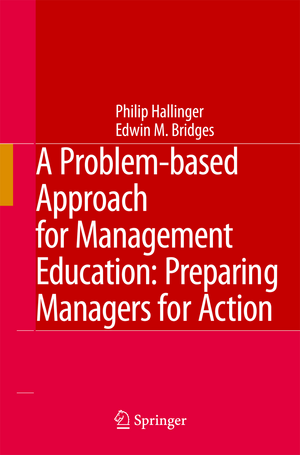A Problem-based Approach for Management Education: Preparing Managers for Action
Autor Philip Hallinger, Edwin M. Bridgesen Limba Engleză Hardback – 24 mai 2007
The authors draw upon their experience in using PBL in a broad array of management education programs at the Bachelor, Master, Doctoral and Executive levels, in North America and in Asia. This book is designed to provide both novice and experienced users of PBL with resources for designing and implementing problem-based management education. The book provides the novice with useful theoretical and practical background on how design a PBL curriculum, use PBL in a classroom, and develop PBL materials. At the same time, the book will challenge experienced users of PBL and case teaching to extend their applications through the use of learning technologies and more systematic approaches to assessment and curriculum design.
| Toate formatele și edițiile | Preț | Express |
|---|---|---|
| Paperback (1) | 947.18 lei 6-8 săpt. | |
| SPRINGER NETHERLANDS – 19 oct 2010 | 947.18 lei 6-8 săpt. | |
| Hardback (1) | 953.35 lei 6-8 săpt. | |
| SPRINGER NETHERLANDS – 24 mai 2007 | 953.35 lei 6-8 săpt. |
Preț: 953.35 lei
Preț vechi: 1162.61 lei
-18% Nou
Puncte Express: 1430
Preț estimativ în valută:
182.44€ • 189.39$ • 152.13£
182.44€ • 189.39$ • 152.13£
Carte tipărită la comandă
Livrare economică 22 martie-05 aprilie
Preluare comenzi: 021 569.72.76
Specificații
ISBN-13: 9781402057557
ISBN-10: 1402057555
Pagini: 356
Ilustrații: XVIII, 326 p.
Dimensiuni: 155 x 235 x 28 mm
Greutate: 0.67 kg
Ediția:2007
Editura: SPRINGER NETHERLANDS
Colecția Springer
Locul publicării:Dordrecht, Netherlands
ISBN-10: 1402057555
Pagini: 356
Ilustrații: XVIII, 326 p.
Dimensiuni: 155 x 235 x 28 mm
Greutate: 0.67 kg
Ediția:2007
Editura: SPRINGER NETHERLANDS
Colecția Springer
Locul publicării:Dordrecht, Netherlands
Public țintă
Professional/practitionerCuprins
TO PART I.- PREPARING ‘MANAGERS FOR ACTION’.- PROBLEM-BASED LEARNING: A PROMISING APPROACH TO MANAGEMENT EDUCATION.- DEVELOPING PROBLEM-BASED LEARNING MATERIALS.- IMPLEMENTING PROBLEM-BASED LEARNING IN THE CLASSROOM.- INTEGRATING TECHNOLOGY AND PROBLEM-BASED LEARNING.- STUDENT ASSESSMENT IN A PBL ENVIRONMENT.- PROBLEM-BASED LEARNING AS A CURRICULUM APPROACH.- IMPLEMENTING PROBLEM-BASED LEARNING IN HIGHER EDUCATION PROGRAMS.- TO PART II.- LEADING ORGANIZATIONAL CHANGE.- DATA TO INTELLIGENCE.- NEW PRODUCT POSITIONING.- RETAIL TO e-TAIL.- REORGANIZING FOR COMPETITIVENESS.- EMPLOYEE SELECTION.- A PROBLEM AT ORGANIZATION X.
Textul de pe ultima copertă
The past two decades have witnessed an unrelenting expansion of management education around the world. At the same time, however, influential scholars – Mintzberg, Bennis, Pfeffer and others -- have levelled pointed critiques at these programs questioning their quality and relevance, as well as their approaches to teaching and learning .
‘A Problem-based Approach for Management Education" is a timely contribution for management schools as well as other higher education institutions seeking the means to increase the relevance and quality of their professional education programs. The book describes the use of problem-based learning (PBL) in GRADUATE management education. PBL is an active learning approach first pioneered in medical education, but whose use has grown steadily in a variety of professional fields over the past two decades. This volume is the first of its kind targetting business management.
The authors draw upon their experience in using PBL in a broad array of management education programs at the Bachelor, Master, Doctoral and Executive levels, in North America and in Asia. They propose PBL as a means by which programs can organize an increasingly global MBA curriculum around locally relevant management problems. The book should have a particularly strong appeal for programs in the Asia Pacific region given the inclusion of PBL. Materials developed around management problems in Asia.
This book is designed to provide both novice and experienced users of PBL with resources for designing and implementing problem-based management education. The book provides the novice with useful theoretical and practical background on how to design a PBL curriculum, use PBL in a classroom, and develop PBL materials. At the same time, the book will challenge experienced users of PBL and case teaching to extend their applications through the use of learning technologies and more systematic approaches to assessment andcurriculum design. Finally, the volume includes a set of sample PBL materials that provide readers with in-dept examples of what a PBL unit looks like and how it may be employed in the classroom.
‘A Problem-based Approach for Management Education" is a timely contribution for management schools as well as other higher education institutions seeking the means to increase the relevance and quality of their professional education programs. The book describes the use of problem-based learning (PBL) in GRADUATE management education. PBL is an active learning approach first pioneered in medical education, but whose use has grown steadily in a variety of professional fields over the past two decades. This volume is the first of its kind targetting business management.
The authors draw upon their experience in using PBL in a broad array of management education programs at the Bachelor, Master, Doctoral and Executive levels, in North America and in Asia. They propose PBL as a means by which programs can organize an increasingly global MBA curriculum around locally relevant management problems. The book should have a particularly strong appeal for programs in the Asia Pacific region given the inclusion of PBL. Materials developed around management problems in Asia.
This book is designed to provide both novice and experienced users of PBL with resources for designing and implementing problem-based management education. The book provides the novice with useful theoretical and practical background on how to design a PBL curriculum, use PBL in a classroom, and develop PBL materials. At the same time, the book will challenge experienced users of PBL and case teaching to extend their applications through the use of learning technologies and more systematic approaches to assessment andcurriculum design. Finally, the volume includes a set of sample PBL materials that provide readers with in-dept examples of what a PBL unit looks like and how it may be employed in the classroom.
Caracteristici
Provides practical examples of PBL cases, including cases designed and used in Asia Explores how PBL can make knowledge about management locally relevant Clarifies how PBL can enable students to apply their knowledge to real problems Comprehensive approach to understanding how one can develop the use of PBL in an institution of higher education Clarifies how PBL differs from case teaching and how the method achieves a more powerful impact














